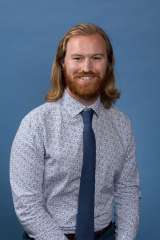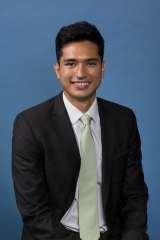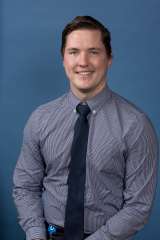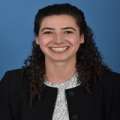Resident Research
Research is an integral part of the resident training experience at UCLA Urology. Every year the Urology fourth-year (R4) residents choose a research project and work with a faculty mentor to develop their specific project. Our Department is fortunate to have excellent clinicians and researchers on faculty working on a wide variety of research projects. We firmly believe this has enabled us to build a comprehensive and cohesive academic residency program.
2025 Resident Research

Dr. Jolie Shen is dedicating her research year to investigating immune tolerance strategies in kidney transplantation under the mentorship of Dr. Jeffrey Veale, Professor of Urology and Director of the UCLA Kidney Exchange Program. Her work focuses on delayed donor stem cell infusion in recipients who have already undergone kidney transplantation—a novel approach aimed at inducing immune tolerance months or even years after the initial surgery. The goal is to provide these patients with a path toward discontinuing toxic immunosuppressive medications while preserving long-term graft function.
In parallel, Dr. Shen is also working with Dr. Nima Nassiri on a study funded by the American Urological Association Research Scholar Program to evaluate testosterone replacement therapy in hypogonadal men with end-stage renal disease undergoing renal transplantation. This study aims to fill a critical gap by investigating the safety and efficacy of TRT as an addition to the ERAS protocol, hypothesizing that it will enhance recovery, reduce postoperative complications, and improve overall outcomes, including graft survival and quality of life. If successful, this study could lead to broader integration of hormonal optimization strategies within ERAS frameworks for surgical patients, particularly in the field of organ transplantation

Dr. Tooke will be dedicating his upcoming research year to the study of clinical informatics, under the mentorship of Dr. Jennifer Singer. His work will focus on the development and implementation of informatics tools to enhance the delivery of care for urology patients. As part of this effort, he plans to participate in a Physician Build Course to gain hands-on experience with electronic health record customization and clinical decision support systems. This builds on his experience during his PGY-3 year, when he completed a Resident Informatics Program and focused on developing a bladder cancer surveillance module within the electronic health record. Through this dedicated research year, Dr. Tooke aims to further explore how data-driven solutions can improve workflow efficiency, patient outcomes, and evidence-based practice within urology.


2024 Resident Research

Dr. Asha Ayub is spending her research year investigating the use of 3D modeling software as a patient education and surgical planning tool under the mentorship of Dr. Joseph Shirk, UCLA Urology assistant professor and Chief of Urology at the Greater Los Angeles VA Health System. She will be studying how virtual 3D models constructed from patients’ MRI or CT images can be used as a decisional aide to help them better understand small renal masses. “This technology has the ability to drastically improve patients understanding of their disease process and thus be able to truly engage in shared decision making. It takes the abstract concept of a mass and creates a tangible representation of it.” In addition, Dr. Ayub will also be working on a project to assess the feasibility of using the 3D modeling software to create tumor maps for bladder cancer and assess the concordance between standard visual inspection intra-operatively and tumor maps to identify opportunities to improve surgical planning for bladder cancer. “My work this year allows me to build on my prior work in health services research and also explore how to improve urologic oncology outcomes with novel technologies.

Dr. Aboubacar Kaba is spending his research year under the apprenticeship of Dr. Brian Shuch, UCLA Urology associate professor, director of the Institute of Urologic Oncology Kidney Cancer Program, and Henry Alvin and Carrie L. Meinhardt Chair for Kidney Cancer Research. His main focus will be on evaluating clinical characteristics of small renal masses in immunocompromised patients, with a particular interest in the transplant patient population. He states " we're finding more and more small renal masses and better understanding that we don't have to treat them as aggressively as we once did. For transplant patients, often times these masses are identified at the time of workup for transplantation, which can act as a barrier or delay to transplantation. I hope this work helps us better understand how to best manage this unique patient population.

Dr. Austin Lee is pursuing his research year under the mentorship of Dr. Christopher Saigal, MD, MPH, Professor and Vice Chair of Urology at the UCLA School of Medicine, PI at RAND Corporation. He will specifically be focusing on the impact of shared decision making and the use of digital decision aids to facilitate patient-centered management of nephrolithiasis. With clinical care becoming more personalized, patient-provider mutual understanding is crucial when deciding upon a management decision in often clinically equivocal contexts. In addition to evaluating the role of shared decision making, Austin hopes to continue researching the integration of new technologic advances in the practice of urology. Having always been drawn to the innovative nature of urologic surgery, Austin is compelled to use his research year to further develop these interests through the aforementioned research. He is committed to working at the interface of bridging technologic advancement in urology with the timeless principles of compassionate care to ensure optimal care for all patients.
2022 Resident Research

Dr. Andre Belarmino is devoting his fourth year to leading the research endeavors of the Men’s Clinic at UCLA, under the mentorship and guidance of Drs. Jesse Mills and Sriram Eleswarapu, UCLA Urology faculty members. There, he will focus on identifying causes and possible therapeutic interventions for male factor infertility. His main project utilizes a mail-in semen analysis kit to assess rates of DNA fragmentation among sub-fertile cohorts, and optimization of semen cryopreservation. Dr. Belarmino will collaborate with Fellow Health in its DNA fragmentation test and mail-in semen kits, and will work on projects examining the cost-effectiveness and compliance of mail-in semen testing in the post-vasectomy patient. “My goal for this research year is to further my knowledge of infertility and andrology, and better understand how medical startups can integrate with academic medicine to advance health care,” Dr. Belarmino says.

Dr. Cindy Gu is spending her research year investigating new diagnostic tools to better understand and treat patients afflicted with interstitial cystitis or bladder pain syndrome (IC/BPS), under the guidance and mentorship of Dr. A. Lenore Ackerman, UCLA Urology assistant professor and director of research for the Division of Female Pelvic Medicine and Reconstructive Surgery. Her research project aims to better categorize and identify clinical phenotypes of IC/BPS through objective measures by using machine-learning approaches and identifying unique urinary microbiome groups through PCR and next generation sequencing. “We often see IC/BPS patients in clinic and they can be some of the most difficult patients to treat because we just don’t know enough about them,” Dr. Gu says. “Treatments courses are often prolonged because it requires a lot of trial and error, as each patient’s symptoms are unique. Through better diagnostic tools and more accurate categorization of IC/BPS patients, future treatments and research can be tailored appropriately and accurately."

Dr. Lin Lin is spending her research year investigating the metabolism of a common type of kidney tumor called oncocytoma, under the supervision of Dr. Brian Shuch, UCLA Urology associate professor, director of the Institute of Urologic Oncology Kidney Cancer Program, and Henry Alvin and Carrie L. Meinhardt Chair for Kidney Cancer Research; and Dr. David Shackelford, associate professor in the Division of Pulmonary and Critical Care Medicine and an expert in signal transduction and cancer metabolism. Using next-generation sequencing, gene expression analysis, and metabolic functional assays, the team aims to characterize the metabolic alterations in oncocytomas. “Renal oncocytoma is one of the most commonly encountered benign renal tumors, and currently we are unable to differentiate these lesions from malignant kidney cancers, which leads to unnecessary treatment and tremendous health care costs,” Dr. Lin explains. “We know oncocytomas are densely packed with mitochondria, where the biochemical processes of respiration and energy production occur; given that many cancers have mitochondrial defects, I hope this work will be a critical step toward understanding a wide range of pathologies in urologic cancers.”

Dr. Grace Sollender is spending her research year exploring the experiences of patients and their families with the diagnosis and management of adolescent varicocele. Under the primary mentorship of Dr. Sriram Eleswarapu with Drs. Jennifer Singer and Christopher Saigal as co-mentors, she is employing qualitative research methods to elicit core themes that inform decision-making. "To better counsel patients and their families on how to proceed after diagnosis of a varicocele, this project aims to identify key factors at play when families are making a decision on management. Ultimately, our goal is to improve the patient and family experience," Dr. Sollender notes. She states, "During residency, my clinical work has focused my understanding of the importance of the family perspective as a key component of disease management in pediatric urology. To this end, I hope this work will be an initial step in sparking a career dedicated to taking care of pediatric patients and their families."